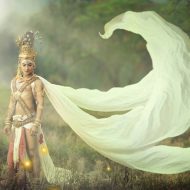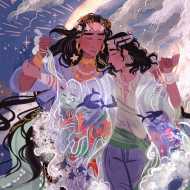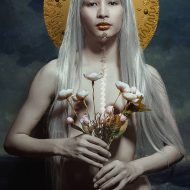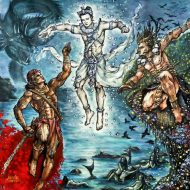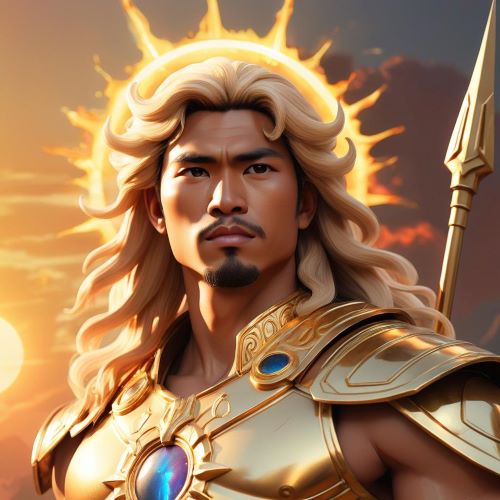Bulan : The Moon God
Listen
At a glance
| Description | |
|---|---|
| Origin | Philippine Mythology |
| Classification | Gods |
| Family Members | Dagat (Father), Paros (Mother), Haliya (Sister), Adlaw (Brother) |
| Region | Philippines |
| Associated With | Moon, Tides, Homosexuality |
Bulan
Introduction
Within the intricate tapestry of Philippine mythology, a vast array of gods and goddesses each symbolizing various facets of life, nature, and the cosmos emerges. Among these celestial beings, Bulan, the god of the moon, stands out as a figure of great intrigue and mystique. In Philippine folklore, Bulan is revered as the deity presiding over the moon, one of the three celestial gods honored by the ancient Bicolano people. Alongside him are the supreme god Gugurang, associated with fire, and his brother Haliya, who embodies the moon.
In the realm of Philippine mythology, Bulan assumes the pivotal role of safeguarding the moon. The moon, revered not only for its otherworldly beauty but also for its indispensable role in guiding agricultural and fishing activities through the lunar calendar, holds a special place in the hearts of Filipinos. Thus, Bulan’s significance extends beyond the confines of mere mythological tales; it is deeply interwoven into the fabric of daily life for the Filipino people.
Physical Traits
Bulan, often depicted as a youthful figure, embodies purity and innocence in his portrayal. As the god of the moon, he symbolizes the guiding light that pierces the darkness of the night, offering direction to those who traverse it. Additionally, Bulan is a poignant emblem of hope and transformation, mirroring the moon’s cyclic journey through its phases, akin to the various stages humans undergo in life.
The visual representation of Bulan diverges across the diverse regions of the Philippines. In some renditions, he appears as a striking young man adorned with radiant silver hair and luminous, silvery skin, mirroring the resplendent glow of the moon itself. Conversely, in other versions, Bulan takes on the guise of an elderly man, his visage etched with the wisdom acquired over centuries of vigilance over the nocturnal sky. Nevertheless, the common thread that unites these variations is his affiliation with the moon’s effulgent radiance.
A popular myth concerning Bulan recounts his transformation into a human form. It is told that Bulan would descend from the celestial realm to assume the guise of a mortal, seeking to mingle with humanity. Yet, his iridescent beauty invariably betrayed his divine nature, making him readily distinguishable among mortals.
Family
Bulan finds his place within the esteemed Bicolano pantheon, where he assumes a pivotal role as the youngest offspring of Dagat, the sea, and Paros, the north wind. Among his divine kin are his elder sister, Haliya, and the sun god, Adlaw. Within the Bicolano belief system, these deities hold profound significance, intertwining with the daily lives of the people. The genesis of Bulan’s divine status, like many myths, fluctuates across the various regions of the Philippines. Nonetheless, a recurrent motif is that of Bulan’s transformation from a mortal into a deity, often catalyzed by an extraordinary act or divine intervention.
One prevalent rendition unveils the tale of Bulan as an ordinary man dwelling in a coastal village. On a fateful night, the village was assailed by a formidable storm, leaving devastation in its wake, with homes and livelihoods hanging by a thread. Amidst the prevailing despair and the looming loss of his cherished ones, Bulan beseeched the gods for salvation. In a response to his earnest entreaties, the moon itself descended from the heavens, bestowing upon Bulan the divine mantle, endowing him with the ability to command its luminance, and ensuring the people’s safeguard from impending harm.
An alternate narrative hints at Bulan as a celestial envoy dispatched by the supreme deity, Bathala, entrusted with the solemn duty of overseeing the nocturnal realm. Bathala, in his wisdom, bestowed upon Bulan the profound responsibility of illuminating the velvety expanse of the nighttime skies, securing the safety and guidance of all those who sought solace beneath the moon’s gentle, silvery embrace.
Other names
Bulan, the moon deity in Philippine mythology, is known by different names in various regions and languages of the Philippines. In Visayan mythology, Bulan is referred to as Libulan. In some parts of the Philippines, Bulan is also known as Mayari. It’s important to note that while these names refer to the moon deity, they may have different connotations and myths associated with them in different regions. For instance, Mayari is also a goddess of revolutions, war, hunt, weaponry, beauty, strength, moon, and night in Tagalog mythology. Similarly, an Iloko tale has Bulan as the god of peace and calm. In addition to these, Bulan is also a term used for “moon” in several Philippine languages and is included in the mythology of some Pangasinan, Manobo, and T’boli tales.
Powers and Abilities
Bulan, along with his sister Haliya, assumes the role of protectors against their fiery and destructive brother, Adlaw. Their divine duty involves harnessing their radiant light to temper Adlaw’s scorching heat, thereby rescuing humanity from unbearable temperatures. Bulan is frequently characterized as a gentle and benevolent deity, a guardian who watches over travelers, lovers, and fishermen. These individuals rely on the moon’s luminous guidance to navigate the dark expanse of the Philippine seas. Furthermore, Bulan’s tranquil disposition mirrors the soothing presence of the moon itself, often acting as a calming force in the face of turbulent tides.
The influence of Bulan extends well beyond the boundaries of mythology, firmly ingrained in the fabric of Philippine culture and traditions. The moon has played an integral role in the lives of Filipinos, particularly in the realms of agriculture and fishing. The lunar calendar, still adhered to in some rural areas, serves as an indispensable guide, orchestrating planting and harvesting seasons in harmony with the moon’s phases.
Modern Day Influence
As with many mythological figures, Bulan’s influence has evolved over time. In contemporary Philippine culture, Bulan is often referenced in literature, music, and art. His character has become a symbol of illumination, wisdom, and serenity, reminding people to find light even in the darkest of times.
Furthermore, Bulan’s representation has transcended the Philippines and has found its way into popular culture, particularly in the realm of fantasy literature and role-playing games. He is frequently incorporated into modern stories and adaptations, adding a touch of Filipino folklore to the global tapestry of mythology.
Related Images
Frequently Asked Questions
What is lorem Ipsum?
I am text block. Click edit button to change this text. Lorem ipsum dolor sit amet, consectetur adipiscing elit. Ut elit tellus, luctus nec ullamcorper mattis, pulvinar dapibus leo.
What is lorem Ipsum?
I am text block. Click edit button to change this text. Lorem ipsum dolor sit amet, consectetur adipiscing elit. Ut elit tellus, luctus nec ullamcorper mattis, pulvinar dapibus leo.
What is lorem Ipsum?
I am text block. Click edit button to change this text. Lorem ipsum dolor sit amet, consectetur adipiscing elit. Ut elit tellus, luctus nec ullamcorper mattis, pulvinar dapibus leo.
What is lorem Ipsum?
I am text block. Click edit button to change this text. Lorem ipsum dolor sit amet, consectetur adipiscing elit. Ut elit tellus, luctus nec ullamcorper mattis, pulvinar dapibus leo.
What is lorem Ipsum?
I am text block. Click edit button to change this text. Lorem ipsum dolor sit amet, consectetur adipiscing elit. Ut elit tellus, luctus nec ullamcorper mattis, pulvinar dapibus leo.


